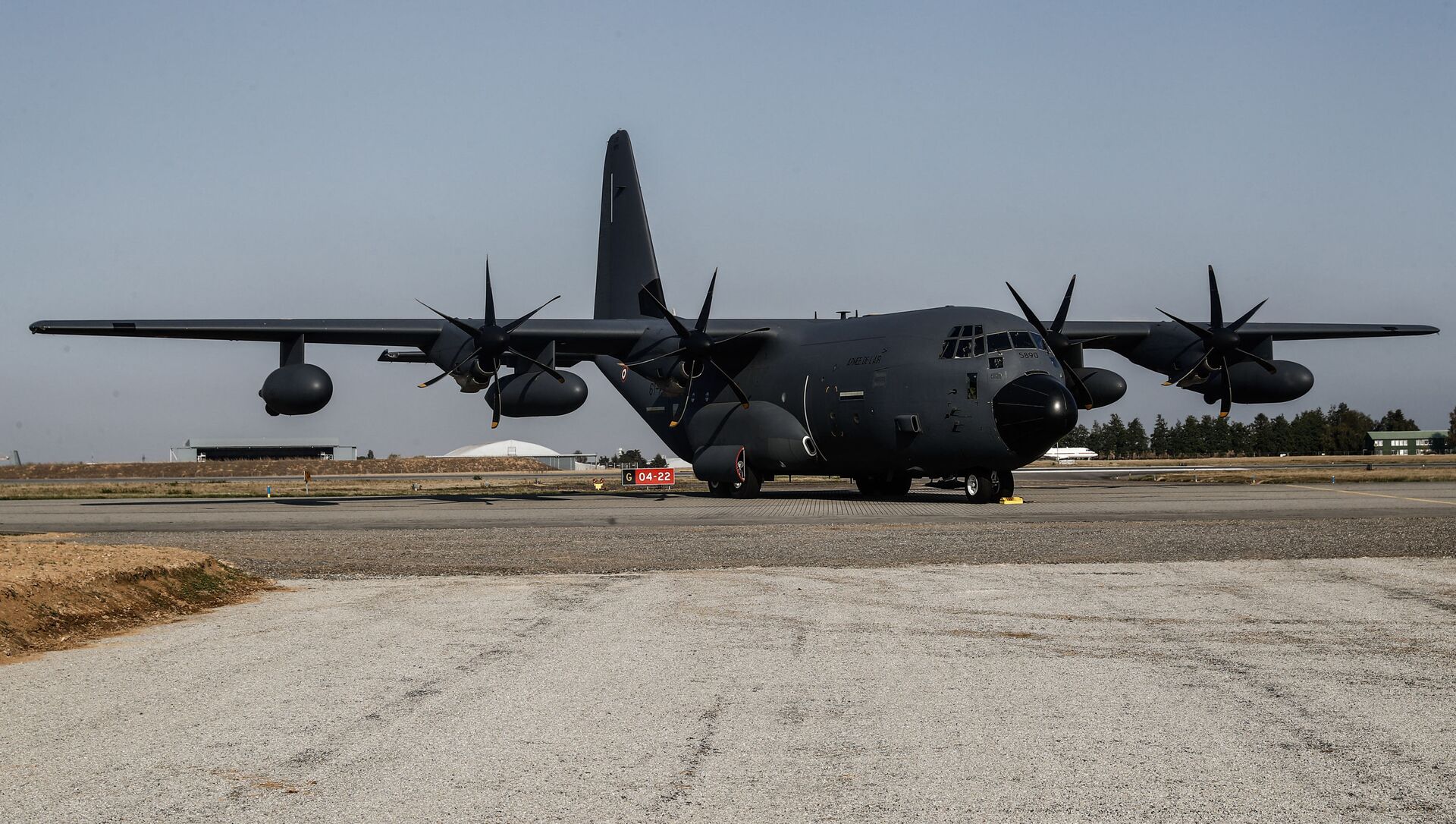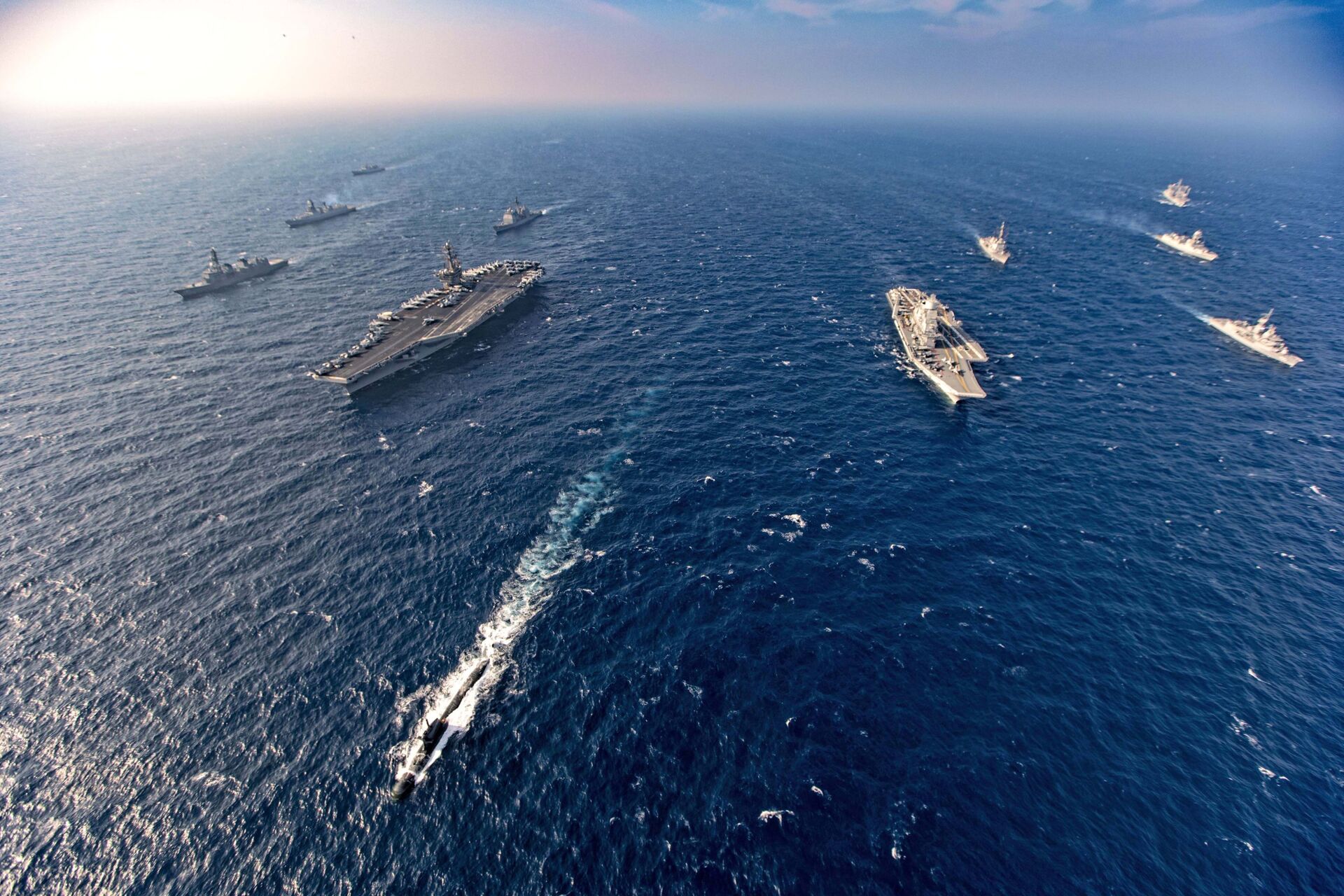https://sputnikglobe.com/20210903/india-us-sign-agreement-to-co-develop-air-launched-uav-to-boost-interoperability-1083787179.html
India, US Sign Agreement to Co-develop Air-Launched UAV to Boost Interoperability
India, US Sign Agreement to Co-develop Air-Launched UAV to Boost Interoperability
Sputnik International
A few days back, a US Navy admiral admitted that Quad members — India, US, Japan and Australia — lack the desired degree of inter-operability as they use... 03.09.2021, Sputnik International
2021-09-03T14:05+0000
2021-09-03T14:05+0000
2023-07-16T05:54+0000
newsfeed
world
us
asia
indian navy
us air force
c-130j
c-17 globemaster
indian defense ministry
us navy
https://cdn1.img.sputnikglobe.com/img/07e5/04/02/1082522570_0:192:3072:1930_1920x0_80_0_0_5c85593eb30c5ffff14285ed8c3a25ad.jpg
In a significant move to strengthen co-operation in the field of defence technology, India and the US have signed a project agreement to co-develop air-launched unmanned vehicles for their air forces. The unmanned aerial vehicle (UAV) systems are being developed under the Defense Technology and Trade Initiative, or DTTI, which seeks opportunities for co-production and development of military technologies between the two countries.Defence sources in New Delhi said that the systems can be launched from aircraft operated by both nations, specifically the Lockheed C-130J Super Hercules - used by the US - and India's Boeing C-17 Globemaster III.With several defence-enabling agreements in place, officials of the two countries, who met on Thursday for the fifth of the 2+2 intercessional talks in Washington, made the commitment to achieve greater interoperability between the US and Indian militaries.During the third week of August, Admiral John C Aquilino, commander of the US Indo-Pacific Command, said in New Delhi that the key to building a successful security partnership rested on frequent communication between the participating countries and interoperability in defence equipment.India has already inked three foundational agreements with the US, which increase the cooperation in security, defence, intelligence, and big tech. According to an estimate, the US has signed Indian defence deals worth more than $21 billion since 2007.
Sputnik International
feedback@sputniknews.com
+74956456601
MIA „Rossiya Segodnya“
2021
Rishikesh Kumar
https://cdn1.img.sputnikglobe.com/img/07e4/08/04/1080055820_0:0:388:389_100x100_80_0_0_40018ee210946d65d49ffba4f4c008e1.jpg
Rishikesh Kumar
https://cdn1.img.sputnikglobe.com/img/07e4/08/04/1080055820_0:0:388:389_100x100_80_0_0_40018ee210946d65d49ffba4f4c008e1.jpg
News
en_EN
Sputnik International
feedback@sputniknews.com
+74956456601
MIA „Rossiya Segodnya“
Sputnik International
feedback@sputniknews.com
+74956456601
MIA „Rossiya Segodnya“
Rishikesh Kumar
https://cdn1.img.sputnikglobe.com/img/07e4/08/04/1080055820_0:0:388:389_100x100_80_0_0_40018ee210946d65d49ffba4f4c008e1.jpg
newsfeed, us, indian navy, us air force, c-130j, c-17 globemaster, indian defense ministry, us navy, us department of defense (dod), uav
newsfeed, us, indian navy, us air force, c-130j, c-17 globemaster, indian defense ministry, us navy, us department of defense (dod), uav
India, US Sign Agreement to Co-develop Air-Launched UAV to Boost Interoperability
14:05 GMT 03.09.2021 (Updated: 05:54 GMT 16.07.2023) A few days back, a US Navy admiral admitted that Quad members — India, US, Japan and Australia — lack the desired degree of inter-operability as they use different kinds of equipment. India’s Chief of Defence Staff, Bipin Rawat, has been an advocate for similar kinds of communication to improve the country's chances in disaster relief work.
In a significant move to strengthen co-operation in the field of defence technology, India and the US have signed a project agreement to co-develop air-launched unmanned vehicles for their air forces. The unmanned aerial vehicle (UAV) systems are being developed under the
Defense Technology and Trade Initiative, or DTTI, which seeks opportunities for co-production and development of military technologies between the two countries.
“The Aeronautical Development Establishment (ADE) at New Delhi's Defence Research and Development Organisation and the Aerospace Systems Directorate at the Air Force Research Laboratory (AFRL), along with the Indian and US Air Forces, are the principal organisations for execution of the project agreement,” the Indian defence ministry said.
Defence sources in New Delhi said that the systems can be launched from aircraft operated by both nations, specifically the Lockheed C-130J Super Hercules - used by the US - and India's Boeing C-17 Globemaster III.
With several defence-enabling agreements in place, officials of the two countries, who met on Thursday for the fifth of the 2+2 intercessional talks in Washington, made the commitment to
achieve greater interoperability between the US and Indian militaries.
“Discussions also drove progress toward operationalising key bilateral initiatives on information-sharing, logistics, defence industrial cooperation, and joint doctrine engagement through liaison exchanges,” a statement issued by the US Department of Defense reads.
During the third week of August, Admiral John C Aquilino, commander of the US Indo-Pacific Command, said in New Delhi that the key to building a successful security partnership rested on frequent communication between the participating countries and interoperability in defence equipment.
India has already inked three foundational agreements with the US, which increase the cooperation in security, defence, intelligence, and big tech. According to an estimate, the US has signed Indian defence deals worth more than $21 billion since 2007.





